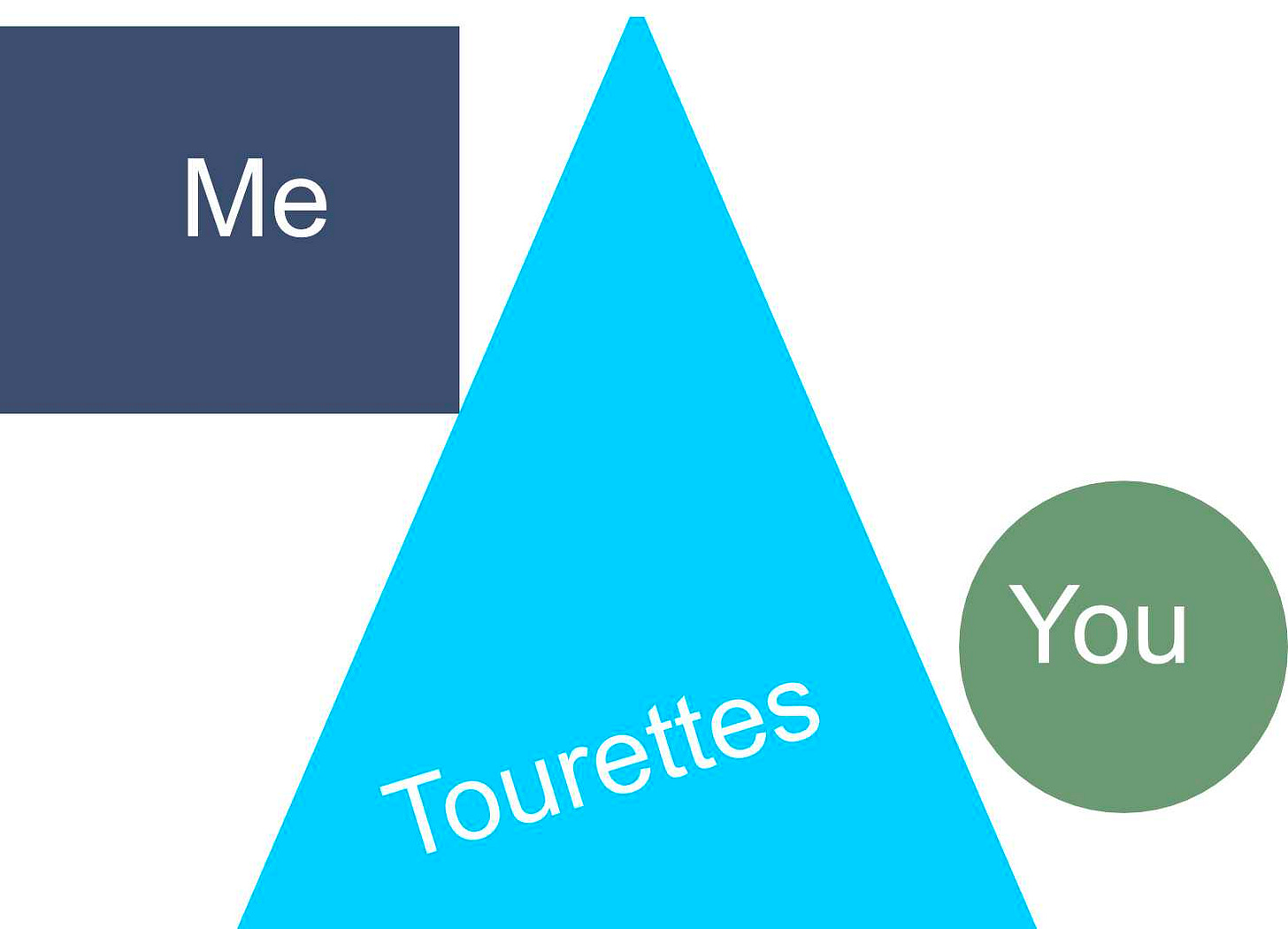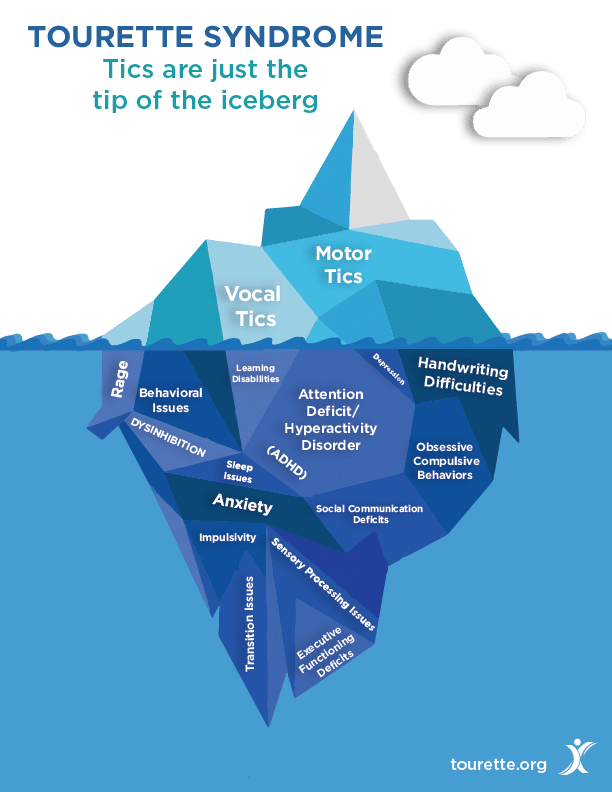Tourette's and Me
stigma, inattention, and mood disorders. Oh my. How the disorder affects my day-to-day

An undulating childhood
I was in my formative years as a child (around 6 or so) when I first encountered the invisible enemy. It began in my neck, as a backwards jerking motion of my head. Then it spread to my face, with annoying and sometimes painful eye blinking.
At first it only annoyed me. But the real pain would come when family members began to notice. I’m not sure exactly who first noticed my tics, but I have a vivid memory of my grandmother first noticing my abnormal head movements.
As an Italian woman (originally from italy) I’m not sure she had quite seen anything like it, so I understand her bewilderment! But at the time, I was upset and frigthetend because I didnt quite know what was going on with my body.
Fast forward to Junior High school (which I hated), and my tics are in full force. I am no longer to hide my tics. My vocal tics also begin to emerge at this point, mostly in the form of repeating catch phrases from movies to my family. Luckily I was able to hold them in while at school. However, my motor tics are what really made my middle school experience hell.
Mostly due to the impact it left on my self-esteem. Everyone wants to fit in, especially kids. And People can be mean, especially kids. I’ll never forget how embarrassed I felt when other kids noticed my tics. Some of them even immitated my own tics back to me, which especially hurt. keep in mind, I haven’t officially gotten diagnosed with Tourette’s… I just thought I am a weird alien from another planet.
Speaking of, wyat is tourette’s anyway? I bet you have an outlandish mental-model of what it is!
What is Tourette’s syndrome?
Well, I certainly know what it is, because I have lived it. In my opinion(I’m no doctor), it is best to think of Tourette’s syndrome (TS) as a spectrum, with tic disorder (what i thought I had for years… a story for another day) at the mild end of the spectrum, and Tourette’s at the more severe end of the spectrum.
The bottom line is, everyone with Tourette’s has different combination of symptoms and severity, but the core traits must be there to meet diagnostic criteria.
According to Mayo Clinic,
Tourette (too-RET) syndrome is a disorder that involves repetitive movements or unwanted sounds (tics) that can't be easily controlled. For instance, you might repeatedly blink your eyes, shrug your shoulders or blurt out unusual sounds or offensive words.
Tics typically show up between ages 2 and 15, with the average being around 6 years of age. Males are about three to four times more likely than females to develop Tourette syndrome.
Mayo clinic didnt mention the diagnositc criteria though! Check out what the CDC says
To be diagnosed with TS, a person must:
have two or more motor tics (for example, blinking or shrugging the shoulders) and at least one vocal tic (for example, humming, clearing the throat, or yelling out a word or phrase), although they might not always happen at the same time.
have had tics for at least a year. The tics can occur many times a day (usually in bouts) nearly every day, or off and on.
have tics that begin before age 18 years.
have symptoms that are not due to taking medicine or other drugs or due to having another medical condition (for example, seizures, Huntington disease, or postviral encephalitis).
Alright! Now thaty we have gottwn the diagnostic criteria and my own history of persoanl trauma out the way, we can get into the main question this blog post attempsts to answer.
How TS affects my daily life
We all know life can be difficult at times, but when you have a neuropsychiatric movement disorder (just a fancy term for a movement disorder with psychiatric symptoms), well, it can make life very difficult at times. Here are some ways it impacts my day-to-day
distracting and sometimes painful tics- Some days can be really hard for me, where I have multiple tic attacks (prolonged period of consecutive tics). Not only is it physically and emotionally exhausting at times, it is very distracting. Learning PHP is hard enough without your head jerking around and eyes twitching.
inattention- I am certain I have undiagnosed ADHD. I know everyone says that, but I have years of academic failure and unfinished projects under my belt to shut up the naysayers. Not to mention, TS is comorbid with so many conditions, one of which is ADHD.
This symptom is one of the hardest for me, because it means things take me longer to accomplish, and on bad days I really do need more breaks than others. But no matter what, I get my work donepoor sense of time- this is probabaly related to the attention deficits, as people with ADHD are notorious for being poor managers of time. However, before I started using my PE issued time-timer, I really did treat the day like one long hour.. instead of however normal people see it!
Using the pomordo technique alongside the time-timer has helped me largely overcome this symptom.depression and anxiety- so many people, even those with tourette’s and doctors, overlook the psychiatric side of the disorder. I have alot of periods of depression and anxiety. The anxiety can make it hard for me to remain present in conversations, as I am too busy supressing my tics. Thanks to the skills I have learned in therapy, I have learned to work through this.
Tourettes is much more than just tics
Look at this illustration, appropriately named the tourete’s iceberg. Now Imagine a student going through the educational system with all those problems, and having no name or educational plan to tackle them. Well, I was that student! So if you suspect your child (or you, or other adult friend) may have this disorder, it is worth exploring a diagnose.
Your future self will thank you.



